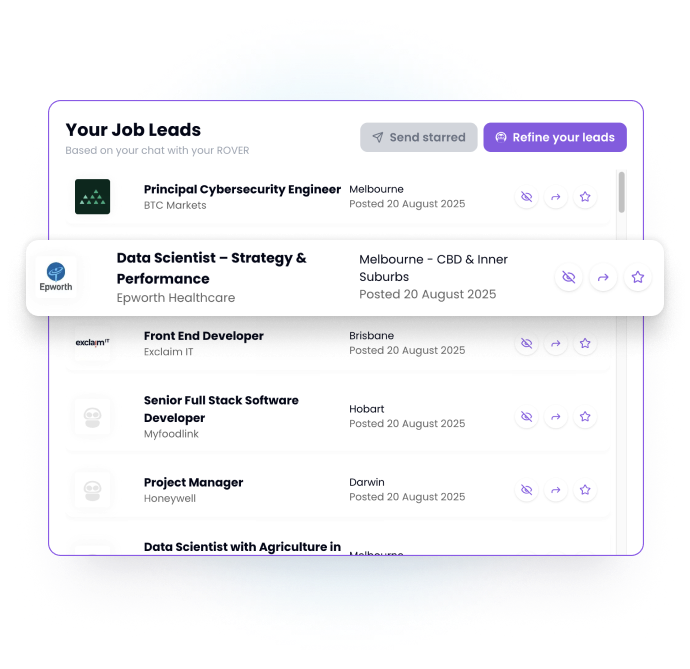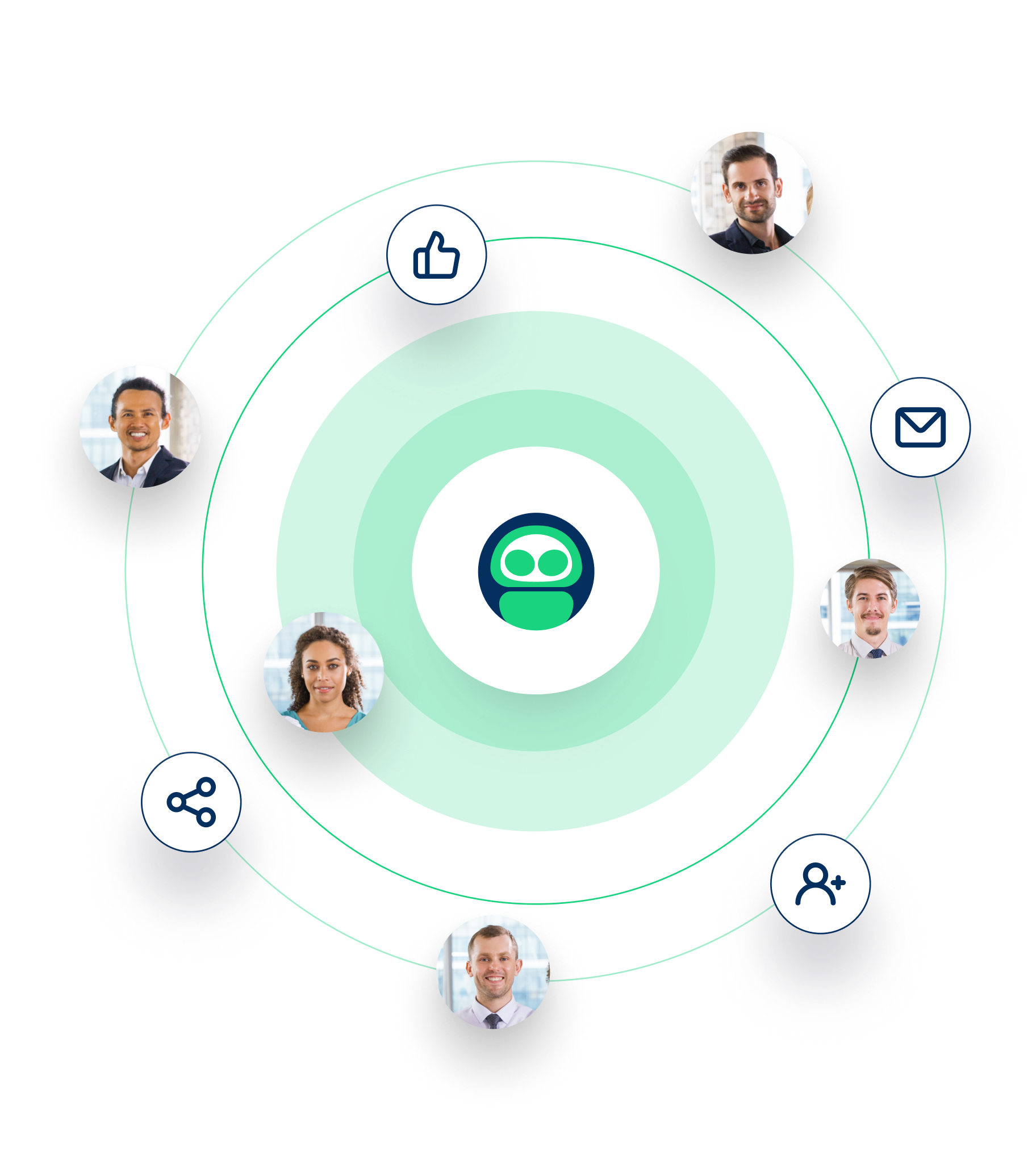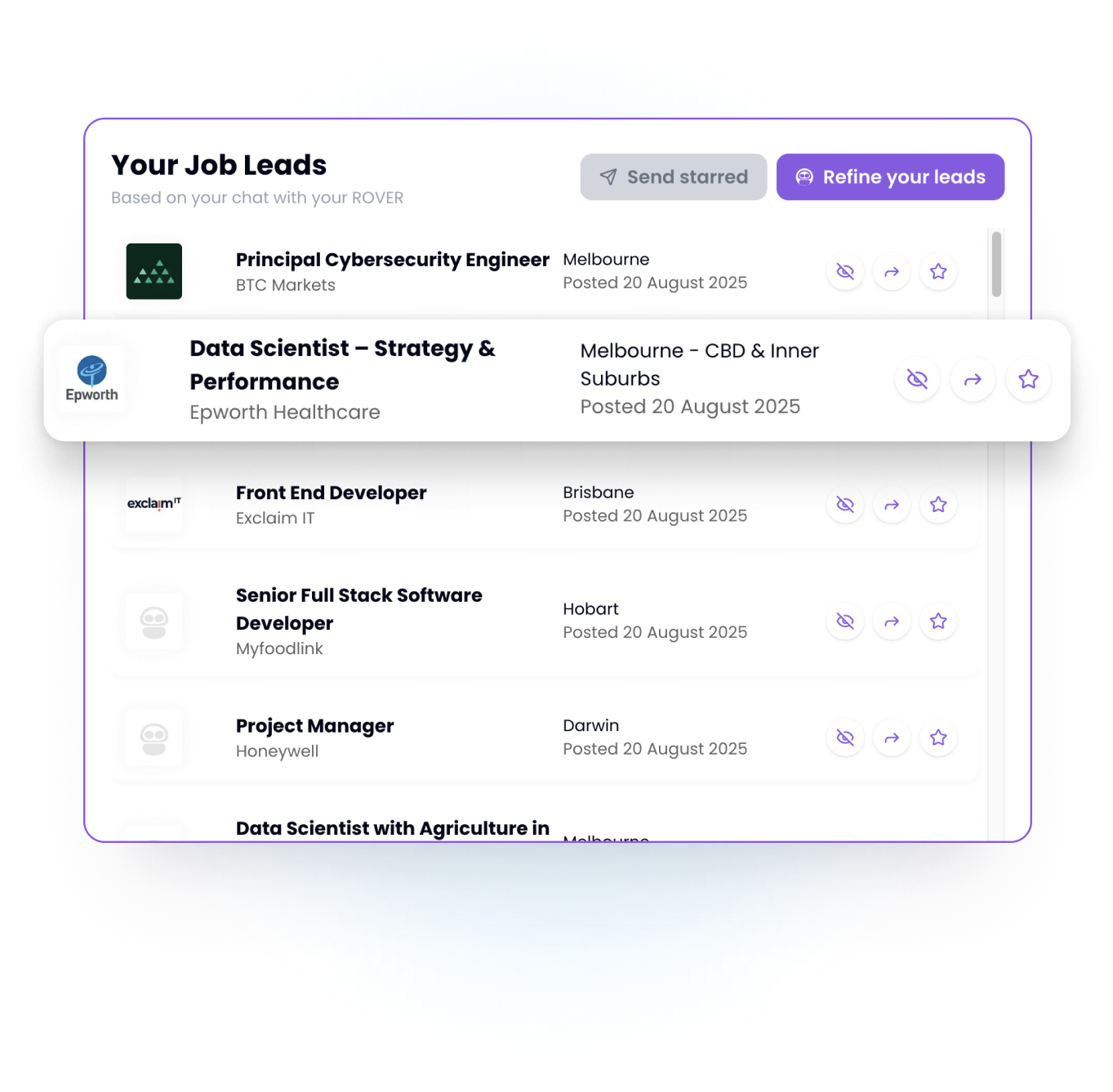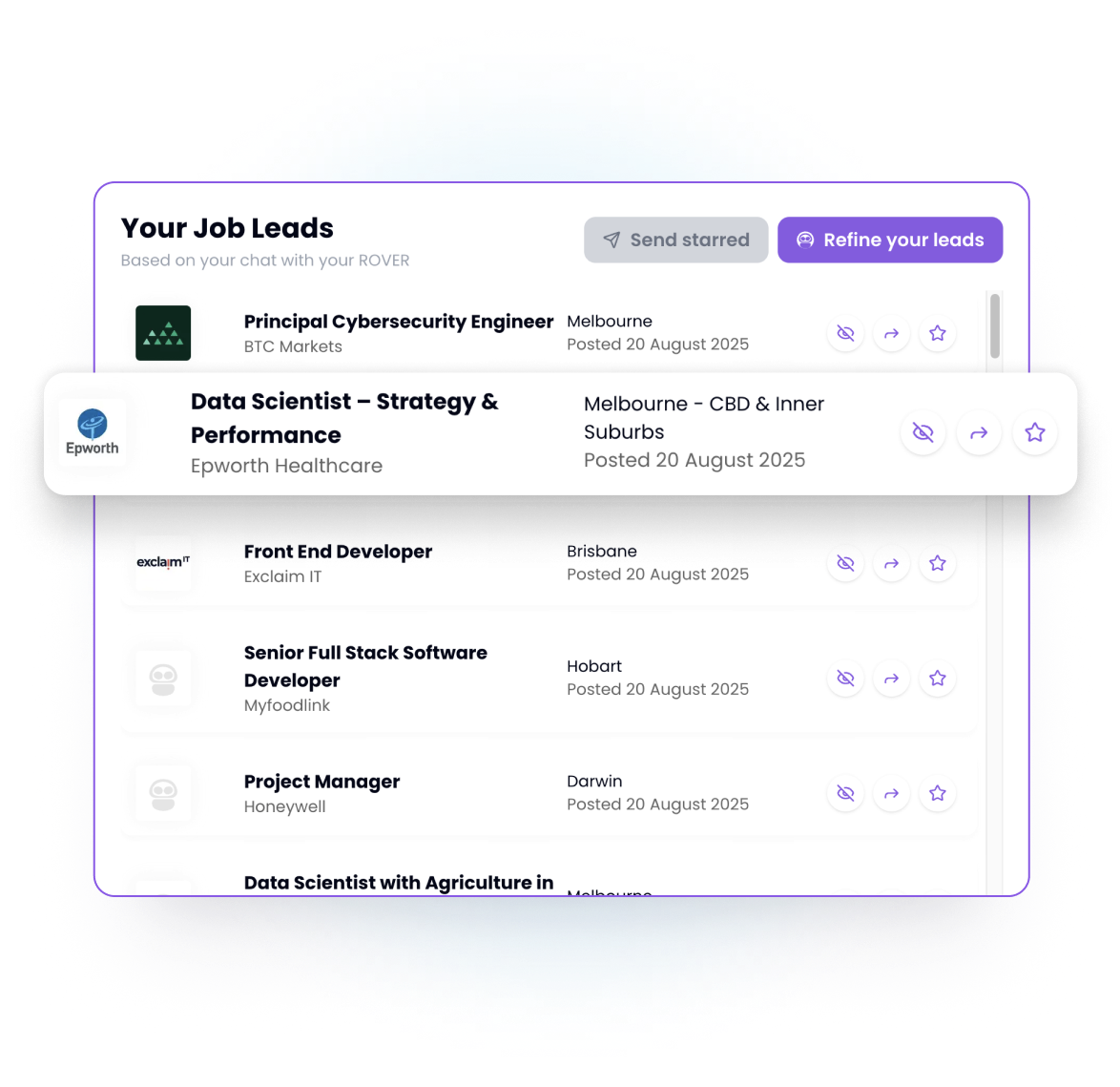Built by technologists. Powered by AI.
Trusted by businesses across ANZ.
We help teams implement AI, automation, & data tools to unlock scale.
Book a Meet
Trusted by Recruiters, SaaS, B2B businesses, HR teams & others across ANZ



AI Products We’ve Built: ROVERs
AI-powered products built to help recruiters, founders, & teams across ANZ grow smarter & faster.
157+
New Job Leads Today
Updated as of 09/24/2025
JobROVER - AI
Every job from everywhere, everyday. Powered by AI.
JobROVER AI is a recruiter’s best buddy. A smart assistant that finds fresh, targeted job leads across the ANZ market. Just tell it what you want, and it’ll deliver new leads daily, straight to your inbox.
Make 20% more placement
Save 3–5 hours of searching each week
Identify hiring activity before your competitors do
Visit JobROVER
7-days free. 2-min setup. No credit card. No contract. $19/user/mth.
JobROVER - Analytics
Market-wide job insights. Built for recruitment leaders.
Our analytics platform gives recruitment leaders a complete view of job trends, sector shifts, and job lead activity across ANZ. Ideal for planning, reporting, and uncovering opportunities before others do.
Visualise job trends in your exact niche
Export tailored insights for leadership and clients
Built on the most comprehensive job database in ANZ
Book a Meet
14-days free. 12-month contract. $995/mth.
Your sector trend
Last 90 days
Aug
Sep
Oct
124 Jobs

JobROVER - API
Live ANZ job market data, integrated into your platform.
JobROVER API connects your systems directly to our jobs database, the largest and most accurate in ANZ. Ideal for platforms, marketplaces, and workforce tools that need fresh, structured job data.
Access live and historical job feeds
Tailor endpoints to your exact use case
Built for scale, reliability and speed
Book a Meet
Custom pricing available on request.

leadROVER - Automation
Get LinkedIn right the first time.
LeadROVER automates your LinkedIn outreach so you can win more clients and candidates while saving hours each week. Built for recruiters, HR tech, and B2B sales teams who want to grow smarter and faster.
Automate LinkedIn connection, messaging, and follow-up
Book more meetings with ideal prospects
Save 10+ hours a week on manual outreach
Visit LeadROVER
14-day free trial. No credit card required.
Meet the Founders

Dr. Jessica Huggins
PhD - Science.
15 years experience in data, software, leadership.

Saxon Huggins
Masters - Business Administration.
15 years founding HR tech/service businesses.
The team behind JobROVER, LeadROVER & WebROVER.
Curious about how ROVER AI could work for you?
Book a meeting with our team and see what’s possible.
Book a Meet
TESTIMONIALS
Built by technologists. Powered by AI.
Trusted by businesses across ANZ.
We help teams implement AI, automation, & data tools to unlock scale.
Book a Meet
Trusted by Recruiters, SaaS, B2B businesses, HR teams & others across ANZ



AI Products We’ve Built: ROVERs
AI-powered products built to help recruiters, founders, & teams across ANZ grow smarter & faster.
157+
New Job Leads Today
Updated as of 09/24/2025
JobROVER - AI
Every job from everywhere, everyday. Powered by AI.
JobROVER AI is a recruiter’s best buddy. A smart assistant that finds fresh, targeted job leads across the ANZ market. Just tell it what you want, and it’ll deliver new leads daily, straight to your inbox.
Make 20% more placement
Save 3–5 hours of searching each week
Identify hiring activity before your competitors do
Visit JobROVER
7-days free. 2-min setup. No credit card. No contract. $19/user/mth.
JobROVER - Analytics
Market-wide job insights. Built for recruitment leaders.
Our analytics platform gives recruitment leaders a complete view of job trends, sector shifts, and job lead activity across ANZ. Ideal for planning, reporting, and uncovering opportunities before others do.
Visualise job trends in your exact niche
Export tailored insights for leadership and clients
Built on the most comprehensive job database in ANZ
Book a Meet
14-days free. 12-month contract. $995/mth.
Your sector trend
Last 90 days
Aug
Sep
Oct
124 Jobs

JobROVER - API
Live ANZ job market data, integrated into your platform.
JobROVER API connects your systems directly to our jobs database, the largest and most accurate in ANZ. Ideal for platforms, marketplaces, and workforce tools that need fresh, structured job data.
Access live and historical job feeds
Tailor endpoints to your exact use case
Built for scale, reliability and speed
Book a Meet
Custom pricing available on request.

Get LinkedIn right the first time.
LeadROVER automates your LinkedIn outreach so you can win more clients and candidates while saving hours each week. Built for recruiters, HR tech, and B2B sales teams who want to grow smarter and faster.
Automate LinkedIn connection, messaging, and follow-up
Book more meetings with ideal prospects
Save 10+ hours a week on manual outreach
Visit LeadROVER
14-day free trial. No credit card required.
Meet the Founders

Dr. Jessica Huggins
PhD - Science.
15 years experience in data, software, leadership.

Saxon Huggins
Masters - Business Administration.
15 years founding HR tech/service businesses.
The team behind JobROVER, LeadROVER & WebROVER.
Curious about how ROVER AI could work for you?
Book a meeting with our team and see what’s possible.
Book a Meet
Saves hours a day
"We introduced ROVER to our franchisees with amazing uptake."

Jeff BaileyDirector National Operations
Great Tool
"ROVER is a great tool to better understand our market."

Tim NewhamQueensland General Manager, Randstad
Well Done!!
"We use ROVER to know when our top tier clients are recruiting."

James AldridgeCEO & Founder
So Useful
"ROVER's data rich reports evidence actual workforce shortages."

Jade Mortlock,
National Solutions Manager, Randstad
Unique Insights
"ROVER data provides unique insights to enable our marketing."

Anelise Hynes,
APAC Marketing Lead, Bullhorn
Excellent team!!!
"They are a partner with expertise in adding value to our business."

Jamie Conyngham,
Chief Executive Officer
TESTIMONIALS
Our clients love what we’ve built
Built by technologists. Powered by AI.
Trusted by businesses across ANZ.
We help teams implement AI, automation, & data tools to unlock scale.
Book a Meet
Trusted by Recruiters, SaaS, B2B businesses, HR teams & others across ANZ



AI Products We’ve Built: ROVERs
AI-powered products built to help recruiters, founders, & teams across ANZ grow smarter & faster.
JobROVER - AI
Every job from everywhere, everyday. Powered by AI.
JobROVER AI is a recruiter’s best buddy. A smart assistant that finds fresh, targeted job leads across the ANZ market. Just tell it what you want, and it’ll deliver new leads daily, straight to your inbox.
Make 20% more placement
Save 3–5 hours of searching each week
Identify hiring activity before your competitors do
Visit JobROVER
7-days free. 2-min setup. No credit card. No contract. $19/user/mth.
157+
New Job Leads Today
Updated as of 09/24/2025
Your sector trend
Last 90 days
Aug
Sep
Oct
124 Jobs
JobROVER - Analytics
Market-wide job insights. Built for recruitment leaders.
Our analytics platform gives recruitment leaders a complete view of job trends, sector shifts, and job lead activity across ANZ. Ideal for planning, reporting, and uncovering opportunities before others do.
Visualise job trends in your exact niche
Export tailored insights for leadership and clients
Built on the most comprehensive job database in ANZ
Book a Meet
14-days free. 12-month contract. $995/mth.
JobROVER - API
Live ANZ job market data, integrated into your platform.
JobROVER API connects your systems directly to our jobs database, the largest and most accurate in ANZ. Ideal for platforms, marketplaces, and workforce tools that need fresh, structured job data.
Access live and historical job feeds
Tailor endpoints to your exact use case
Built for scale, reliability and speed
Book a Meet
Custom pricing available on request.


Get LinkedIn right the first time.
LeadROVER automates your LinkedIn outreach so you can win more clients and candidates while saving hours each week. Built for recruiters, HR tech, and B2B sales teams who want to grow smarter and faster.
Automate LinkedIn connection, messaging, and follow-up
Book more meetings with ideal prospects
Save 10+ hours a week on manual outreach
Visit LeadROVER
14-day free trial. No credit card required.
Meet the Founders

Dr. Jessica Huggins
PhD - Science.
15 years experience in data, software, leadership.

Saxon Huggins
Masters - Business Administration.
15 years founding HR tech/service businesses.
The team behind JobROVER, LeadROVER & WebROVER.
Curious about how ROVER AI could work for you?
Book a meeting with our team and see what’s possible.
Book a Meet
Saves hours a day
"We introduced ROVER to our franchisees with amazing uptake."

Jeff BaileyDirector National Operations
Great Tool
"ROVER is a great tool to better understand our market."

Tim NewhamQueensland General Manager, Randstad
Well Done!!
"We use ROVER to know when our top tier clients are recruiting."

James AldridgeCEO & Founder
So Useful
"ROVER's data rich reports evidence actual workforce shortages."

Jade Mortlock,
National Solutions Manager, Randstad
Unique Insights
"ROVER data provides unique insights to enable our marketing."

Anelise Hynes,
APAC Marketing Lead, Bullhorn
Excellent team!!!
"They are a partner with expertise in adding value to our business."

Jamie Conyngham,
Chief Executive Officer
TESTIMONIALS
Our clients love what we’ve built
